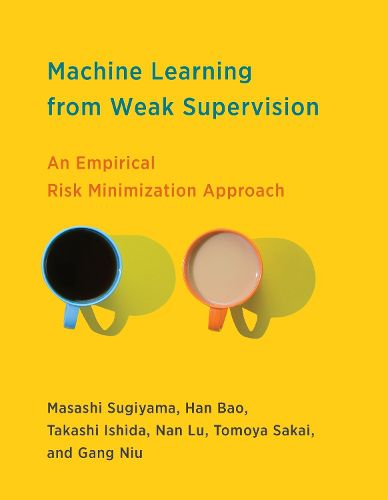Readings Newsletter
Become a Readings Member to make your shopping experience even easier.
Sign in or sign up for free!
You’re not far away from qualifying for FREE standard shipping within Australia
You’ve qualified for FREE standard shipping within Australia
The cart is loading…






Fundamental theory and practical algorithms of weakly supervised classification, emphasizing an approach based on empirical risk minimization.
Standard machine learning techniques require large amounts of labeled data to work well. When we apply machine learning to problems in the physical world, however, it is extremely difficult to collect such quantities of labeled data. This book presents theory and algorithms for weakly supervised learning, a paradigm of machine learning from weakly labeled data. Emphasizing an approach based on empirical risk minimization and drawing on state-of-the-art research in weakly supervised learning, the book provides both the fundamentals of the field and the advanced mathematical theories underlying them. It can be used as a reference for practitioners and researchers and in the classroom.
The book first mathematically formulates classification problems, defines common notations, and reviews various algorithms for supervised binary and multiclass classification. It then explores problems of binary weakly supervised classification, including positive-unlabeled (PU) classification, positive-negative-unlabeled (PNU) classification, and unlabeled-unlabeled (UU) classification. It then turns to multiclass classification, discussing complementary-label (CL) classification and partial-label (PL) classification. Finally, the book addresses more advanced issues, including a family of correction methods to improve the generalization performance of weakly supervised learning and the problem of class-prior estimation.
$9.00 standard shipping within Australia
FREE standard shipping within Australia for orders over $100.00
Express & International shipping calculated at checkout
Fundamental theory and practical algorithms of weakly supervised classification, emphasizing an approach based on empirical risk minimization.
Standard machine learning techniques require large amounts of labeled data to work well. When we apply machine learning to problems in the physical world, however, it is extremely difficult to collect such quantities of labeled data. This book presents theory and algorithms for weakly supervised learning, a paradigm of machine learning from weakly labeled data. Emphasizing an approach based on empirical risk minimization and drawing on state-of-the-art research in weakly supervised learning, the book provides both the fundamentals of the field and the advanced mathematical theories underlying them. It can be used as a reference for practitioners and researchers and in the classroom.
The book first mathematically formulates classification problems, defines common notations, and reviews various algorithms for supervised binary and multiclass classification. It then explores problems of binary weakly supervised classification, including positive-unlabeled (PU) classification, positive-negative-unlabeled (PNU) classification, and unlabeled-unlabeled (UU) classification. It then turns to multiclass classification, discussing complementary-label (CL) classification and partial-label (PL) classification. Finally, the book addresses more advanced issues, including a family of correction methods to improve the generalization performance of weakly supervised learning and the problem of class-prior estimation.